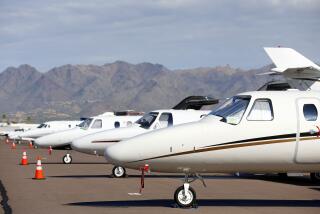Executive Travel : A Taxpayer’s Guide to Making the Most of Still-Deductible Travel Expenses
- Share via
Tax deductions for business travel have been tightened, but there are strategies for making the most of what’s left.
Starting in tax year 1994, for example, the deduction for business meals and entertainment is limited to 50% of the expense, compared to 80% for previous years. Airline club dues are no longer deductible, nor is the cost of taking along your spouse, even if your company encourages it for business reasons.
Many people did not realize how these changes would add up until they saw them in black and white on their returns, said Elaine Gregory of Doyle, Hull & Gregory in Pasadena.
Business people who used to take the standard daily allotment for meals and expenses on the road, for example, may now find it more advantageous to keep records of their actual spending.
*
A lot of people did not know that you can deduct only half the per diem meals and entertainment allotment, she said. The Internal Revenue Service allows between $30 and $38 a day for meals and incidentals, depending on place. There is a separate per diem for lodging that remains 100% deductible.
“They’re usually better off using actual expenses,” Gregory said. “But most people just don’t keep good records.” They forget out-of-pocket expenses such as cab fare, sundries, business gifts (under $25) and tips, all of which can be added up and deducted from income.
Another common expense many people forget to include is dry cleaning away from home, which can add up, especially if you’re on the road for any length of time, said Nadine Gordon Lee, a partner with Ernst & Young in New York.
“It pays to keep good logs,” Gregory said. You don’t need a receipt if the item is less than $25, but you do need a written record.
Keeping notes is also important when it comes to proving which expenses you can write off. With a smaller allowable deduction, people may be tempted to look for more events to write off to help make up the difference.
“I had a client who wanted to deduct part of his daughter’s wedding,” Gregory said. Although he had invited a number of business associates and presumably talked some business at the gathering, that particular deduction was not likely to pass muster with the IRS, she said.
*
Other accountants reported similar arguments for deducting the costs of wakes, bar mitzvahs, front-row tickets at sporting events, even 40th birthday parties. “People have gotten more clever--at least about how to present it,” said Tania Makshanoff of Orr & Makshanoff Accountancy Corp. in Pasadena.
That doesn’t mean, however, that the IRS will concur.
“I had a client who was promoting a book, and as part of the public relations effort, she ended up taking the Orient Express,” Lee said. The IRS decided the trip was an unnecessary business expense and disallowed part of the deduction.
In essence, what makes a meal or entertainment event a deductible business expense is that the primary reason for it is to discuss business, Gregory said. The taxpayer’s best defense is a log in which you have written down not just the expense, but the purpose of the visit.
When it comes to airline club dues and spouse’s travel, on the other hand, there isn’t much you can do to make up for the lost deductions, at least on your federal return.
You can no longer write off the expenses of a spouse who travels with you unless he or she is traveling as an employee of the same company or has a legitimate deductible business reason for going along. California, however, still allows the deduction.
The same is true of airline clubs. You can’t deduct the cost of membership on federal forms, but you can on California returns.
Remember, however, that any expense you incur at the club, such as for fax or secretarial services or food, would be considered part of normal travel expenses and would be deductible, Makshanoff said.
One cautionary note on spousal travel: Many companies will encourage spouses to go along, and even offer to pay their way if they think the spouses will help with entertainment or otherwise facilitate business, Lee said. If the company pays for an employee to take a spouse on a trip, he or she should find out whether the company will show that as compensation to the employee, in which case the employee will be liable for tax on the amount, Lee said.
“You need to discuss it ahead of time with the employer so you understand who gets left holding the bag,” she said. “In some cases, it could end up costing the employee $300 to $500 out-of-pocket in taxes.”
Despite the loss of the spousal deduction, there are ways to combine business and pleasure and still get the business deduction.
When planning a trip, for example, consider doing business on Friday and Monday.
If you do, then Saturday and Sunday count as “work days” in figuring whether the trip is deductible.
A trip is deductible if you spend more than 50% of your time on business, Gregory said. In contrast, if you go to a seminar on Thursday and Friday, stay the weekend and fly home on Monday, you did not spend more than 50% of your time on business, and so could not deduct your expenses for the weekend.
Also, remember that even if your spouse accompanies you on a business trip, you can write off all expenses except the additional expenses incurred by him or her. So, for example, if a room costs the same whether it is occupied by two or one, you can write off the whole cost of the room, Gregory said.
One bright spot for business travelers: Frequent flier miles are still not taxable.
Many accountants expect the IRS to eventually declare these awards income, which would mean travelers would owe taxes on their value. For now, however, they’re still a freebie.
More to Read
Sign up for The Wild
We’ll help you find the best places to hike, bike and run, as well as the perfect silent spots for meditation and yoga.
You may occasionally receive promotional content from the Los Angeles Times.






